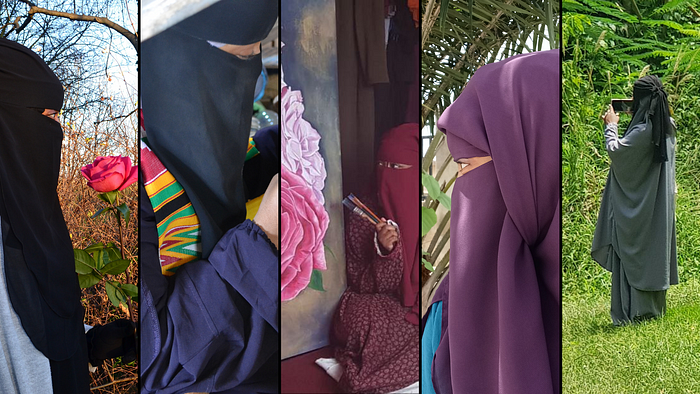5 Reason’s Why You Should Wear the Niqab

Although I don’t officially have a stance on whether the niqab is obligatory or not I do love the niqab and believe that as a Muslim woman there are multiple benefits to wearing it. This post is especially for sisters who are contemplating wearing the niqab as a sunnah for extra reward.
Here are 5 reasons I believe you should wear the niqab even if it’s part time:
🌹Wearing the niqab an easy way to get reward from Allah
Wearing the full hijab and the niqab is an ayah from Allah. Even if you don’t believe it to be mandatory it is at the very least a highly recommended sunnah that you will insha Allah be rewarded for.
In an interview with Shariffa Carlo she says: “It’s an easy barakah you just wear it and walk out”
🌹It can help you to overcome your makeup addiction
I know some niqabi’s still wear their makeup, however if you really have an obsession with it that you can’t leave the house unless you cake your face in makeup the niqab could help you to curb that. It just takes away a lot of the hassle.
Not to mention that some of us wear extreme levels of makeup so obvious it actually takes away from the point of our hijab by making our faces, which are already a focal point of beauty, stand out all the more.
With the niqab if you still want to keep applying your makeup at least its not on display. I wouldn’t go about wearing bright blue eye shadow or anything like that though unless you also cover your eyes.
🌹It can help you to be more ibaadah focused
When we take away the societal pressures of the concept of beauty and what a woman should look like we as Muslimah’s can focus on what’s really important- our deen.
Of course this can be achieved with correct hijab even without covering the face but for some of us the niqab just makes it that much easier.
In my experience as a hijabi I was often encouraged by others to maybe wear my hijab in a more stylish way, or wear a slimmer fit abaya.
Let’s face it the niqab comes with its own challenges because of the many stigmas around wearing it. Yet I feel that pushes me towards acts of worship that are for Allah alone because I am dressing in a way that is not accepted by society.
When I started wearing the niqab I realised that I could recite dhikr without others noticing. This helped me have more patience when it came to standing in queues when I was in public. Instead of getting frustrated and impatient I would take them as opportunities to recite remembrance of Allah.
With niqab I can quietly recite dhikr without looking like a crazy person.
🌹It will increase your haya
At least it worked that way for me. I became a lot more conscious of my movements, how I walked and talked. Especially within close circles. For example it definitely made me think twice about going out to coffee shops with relatives and friends in mixed gatherings. I had also stopped shaking hands with non mahram men before wearing the niqab but wearing the niqab made it that much easier when around Muslim men not to shake hands with them as they automatically expected me not to. Before then as a hijabi I had to politely decline their offer of a handshake, sometimes while they looked offended or confused. The niqab eliminated this completely
🌹Wearing niqab could give you more confidence
If you’re like me and just don’t like physical attention that are based on how you look then the niqab could very well be for you. As a child I was always camera shy and as a hijabi I would never agree to do any public speaking engagements or putting myself out there. No way, I’m just too shy. However with the niqab I have that little bit of extra confidence because I have one less thing to worry about when I feel nervous in public. People can’t see my face. I take great comfort in knowing that even if people are looking at me they aren’t staring at my actual face. I suppose it’s like having more confidence talking to someone over the phone than in person.
Do you have any experience wearing the niqab and if so how do you feel that it helped you?
The Niqabi Diaries is a podcast dedicated to sharing the stories of the Muslim women who have experience wearing the face veil.
Our voices
